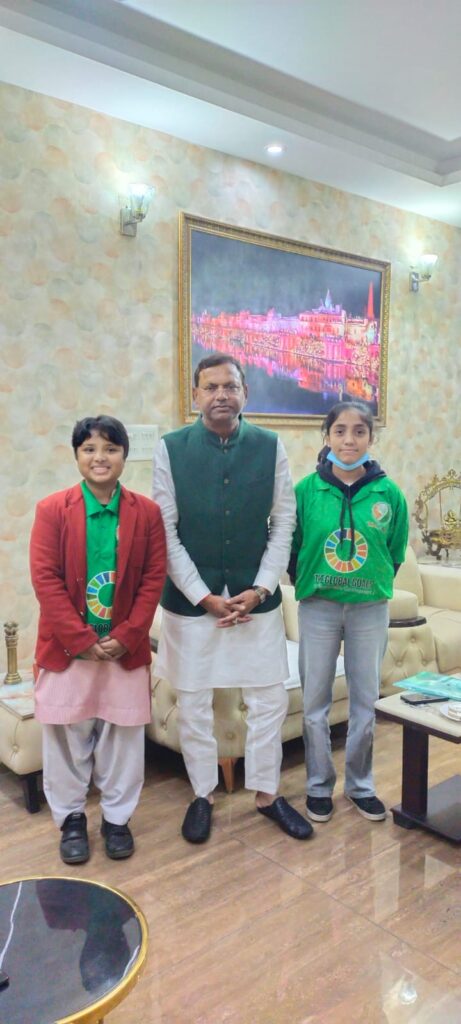Children of the NINEISMINE advocacy initiative interacted with Pankaj Chaudhary -Minister for State, Finance Ministry – with their recommendations for the upcoming National Budget 2023-24. The children presented the ‘Budget For Children’ charter to the minister. This Charter of Demands was a result of numerous local to state and national consultations with over 3500 of their peers across the country.
The interaction was led by Ms. Ruksar Rehman (age 15), the President of the National Inclusive Children’s Parliament. The children’s Charter of Demands stemmed from the report they had submitted to the UN as part of the Universal Periodic Review (UPR) process at Geneva and their Charter on Environmental Rights of children in the lead up to COP 27 in Egypt.
The demands included that the 6% promise for Education (GDP public spending) and 2.5 % on health be reflected in the upcoming union and state budgets for 2023-24. They sought an increase in the investment on all schemes for children particularly on PM –POSHAN scheme. The child-advocates demand an increase (5% GDP public spending) in the budget for the health of their Mother Earth too.
Currently, the education spend stands at 3.56%, which is just below the global average of 3.66%. Health expenditure on the other hand stands at 2.1% as professed by India during the recently concluded UPR session at the United Nations. The UNICEF in its budget analysis report referring to the WHO records stated ‘Even in 2021-22, India’s share of health spending as a percentage of GDP is significantly lower than other countries.’
Pankaj Chaudhary, listened attentively to the young advocates and acclaimed their confidence and their awareness about their rights. Shri Chaudhary said, ‘This is indeed a great initiative. I will place your suggestions before the budget teams.” Further the Finance Minister of State advised the young advocates to seek budget related interactions with other ministries including the education ministry and that of women and child development.
The children praised the Modi Government for its commitment to its schemes particularly the ICDS, the PM Poshan Scheme, the National Education Mission, the National Health Mission and the Swachh Bharat Mission. The UNICEF-India Analysis of the Budget 2022-23, recorded that while there was a sharp increase in investments in the major centrally sponsored schemes since 2016-17, there has been ‘a stagnation or a decline in the allocation (on these schemes) for the budget in 2022-23.’
Ruksar Rehman said, ‘I am glad that the Finance Minister for State met us and modeled for all governments across the country if not the world, on how children must be consulted on all matters affecting them, including budgets’. Ms Rehman said that she is positive that the Modi government will not only fulfill their dream of 9% in budget 2023-24 but even exceed her expectations.
She added that as a child representing 40% of India’s citizens (below 18) and a girl representing 50% of India’s (female) population, ‘I was disappointed to read that only 1% of the central budget is dedicated to the Ministry of Women and Child Development but I’m hopeful that our interaction with the Finance Minister (for State) will see much more of the union budget dedicated to us children and to our mothers and to Mother Earth.’
Kumar Shailabh, Co-Director of HAQ: Centre for Child Rights said, “The share of children in the Union Budget has been on decline over the years. While we continue to live amidst the COVID crisis, the challenges for children have amplified multiple folds at all spectrums.
The loss of learning opportunities due to prolonged school closures, increased child labour, rise in crimes against children, high levels of anaemia and other skewed nutritional indicators pose overall threat to children’s well-being and safety. The upcoming union budget 2023-24 must include these COVID induced vulnerabilities and focus on the last mile reach to secure all rights for all children.”
The current investment in nutrition reduced from 26 paise for every 100 rupees of the GDP spending in 2017-18 to less than “char-aana” (25 paise) in 2022-23 observed the children as they referred to a UNICEF analysis of the last union budget. The investment on the Ministry of Women and Child Development (MWCD) was a low of 60 paise for every 100 rupees budgeted by the union government.
The investment in the MWCD has also seen a steady decline from low of 1% of the Union Government from 2017. The children also recorded sadly that the budget for their safety and protection was a dismal “4p” (.04%) of the Union Budget.
Steve Rocha the National Convener of the NINEISMINE said, ‘This interaction with young citizens without the a vote, is welcomed precedence of consulting children in relation to Budget.’ Mr. Rocha hinted at the recommendation of the Kothari commission (1966) and underlined that the 6% promise is just 55 year behind schedule. He added that ‘each year of failure to invest in children and Mother Earth translates into decades and trillions in terms of intergenerational losses and irreversible deprivation.”



